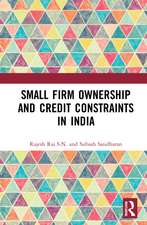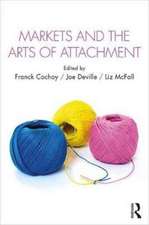Lived Economies of Default: Consumer Credit, Debt Collection and the Capture of Affect: CRESC
Autor Joe Devilleen Limba Engleză Hardback – 11 feb 2015
Drawing on research from the interior of the debt collections industry, as well as debtors' own accounts and historical research into technologies of lending and collection, it examines precisely how this ever more sophisticated, globally connected market functions. It focuses on the highly intimate techniques used to try and recoup defaulting debts from borrowers, as well as on the collection industry’s relationship with lenders. Joe Deville follows a journey of default, from debtors’ borrowing practices, to the intrusion of collections technologies into their homes and everyday lives, to the collections organisation, to attempts by debtors to seek outside help. In the process he shows how to understand this particular market, we need to understand the central role played within it by emotion and affect.
By opening up for scrutiny an area of the economy which is often hidden from view, this book makes a major contribution both to understanding the relationship between emotion and calculation in markets and the role of consumer credit in our societies and economies. This book will be of interest to students, teachers and researchers in a range of fields, including sociology, anthropology, cultural studies, economics and social psychology.
| Toate formatele și edițiile | Preț | Express |
|---|---|---|
| Paperback (1) | 391.11 lei 43-57 zile | |
| Taylor & Francis – 12 dec 2019 | 391.11 lei 43-57 zile | |
| Hardback (1) | 1061.06 lei 43-57 zile | |
| Taylor & Francis – 11 feb 2015 | 1061.06 lei 43-57 zile |
Din seria CRESC
-
 Preț: 286.47 lei
Preț: 286.47 lei -
 Preț: 311.41 lei
Preț: 311.41 lei -
 Preț: 372.17 lei
Preț: 372.17 lei -
 Preț: 325.93 lei
Preț: 325.93 lei -
 Preț: 413.37 lei
Preț: 413.37 lei - 31%
 Preț: 764.20 lei
Preț: 764.20 lei -
 Preț: 365.87 lei
Preț: 365.87 lei - 18%
 Preț: 1499.06 lei
Preț: 1499.06 lei -
 Preț: 451.16 lei
Preț: 451.16 lei - 18%
 Preț: 1055.51 lei
Preț: 1055.51 lei - 15%
 Preț: 437.81 lei
Preț: 437.81 lei -
 Preț: 484.47 lei
Preț: 484.47 lei - 18%
 Preț: 1106.81 lei
Preț: 1106.81 lei - 18%
 Preț: 1059.45 lei
Preț: 1059.45 lei - 26%
 Preț: 821.53 lei
Preț: 821.53 lei -
 Preț: 408.54 lei
Preț: 408.54 lei -
 Preț: 485.03 lei
Preț: 485.03 lei -
 Preț: 448.44 lei
Preț: 448.44 lei -
 Preț: 489.57 lei
Preț: 489.57 lei -
 Preț: 389.38 lei
Preț: 389.38 lei - 26%
 Preț: 819.41 lei
Preț: 819.41 lei - 18%
 Preț: 1604.80 lei
Preț: 1604.80 lei - 18%
 Preț: 1055.38 lei
Preț: 1055.38 lei -
 Preț: 488.33 lei
Preț: 488.33 lei - 18%
 Preț: 1055.51 lei
Preț: 1055.51 lei - 18%
 Preț: 1062.98 lei
Preț: 1062.98 lei -
 Preț: 473.20 lei
Preț: 473.20 lei -
 Preț: 489.26 lei
Preț: 489.26 lei -
 Preț: 410.50 lei
Preț: 410.50 lei - 18%
 Preț: 1000.76 lei
Preț: 1000.76 lei - 18%
 Preț: 734.14 lei
Preț: 734.14 lei - 26%
 Preț: 766.12 lei
Preț: 766.12 lei - 18%
 Preț: 1000.27 lei
Preț: 1000.27 lei -
 Preț: 466.45 lei
Preț: 466.45 lei - 18%
 Preț: 1056.28 lei
Preț: 1056.28 lei -
 Preț: 454.81 lei
Preț: 454.81 lei
Preț: 1061.06 lei
Preț vechi: 1293.97 lei
-18% Nou
Puncte Express: 1592
Preț estimativ în valută:
203.04€ • 212.52$ • 168.99£
203.04€ • 212.52$ • 168.99£
Carte tipărită la comandă
Livrare economică 31 martie-14 aprilie
Preluare comenzi: 021 569.72.76
Specificații
ISBN-13: 9780415622509
ISBN-10: 0415622506
Pagini: 230
Ilustrații: 32
Dimensiuni: 156 x 234 x 23 mm
Greutate: 0.64 kg
Ediția:1
Editura: Taylor & Francis
Colecția Routledge
Seria CRESC
Locul publicării:Oxford, United Kingdom
ISBN-10: 0415622506
Pagini: 230
Ilustrații: 32
Dimensiuni: 156 x 234 x 23 mm
Greutate: 0.64 kg
Ediția:1
Editura: Taylor & Francis
Colecția Routledge
Seria CRESC
Locul publicării:Oxford, United Kingdom
Public țintă
Postgraduate and UndergraduateCuprins
Introduction: Lived economies of default 1. ‘A Curious and Sort of Subconscious Temptation’: The lure of consumer credit 2. In the Fold of Default: Living with market attachments 3. The Discovery and Capture of Affect: A history of debt collection 4. The Strategic Management of Affect: Venturing inside the collections company 5. The Amplification of Calculative Opacity: The creditor, the collector, the collections letter Conclusion: Bringing affect to markets
Recenzii
In this unique and trenchant study, Joe Deville explains how the debt collection industry emerged, how it is evolving, and how it is ever more dependent on both data analytics and emotional labor. Deville illuminates the quotidian work of debt collection agencies and their tools—telephone scripts, collection letters—as well as the intra- and intercorporate and personal relations that make debt collection an affective as well as a political (and profitable) enterprise. The book is nothing less than a theoretically astute reflection on the character of obligation, the making of markets and the character of affect in the entanglements of debt today.
Bill Maurer, Dean of the School of Social Sciences and Professor of Anthropology, University of California, Irvine
Debt, it turns out, is not the only thing that is intimate and impersonal, cumulative and disintegrative, charged and discharged. By following out the ways that affect routes though the bodies of debtors and the modulating assemblages of debt collectors, Joe Deville offers a vivid account of consumer default that pulses with everyday intensities and calculative capturings. Immensely readable and deftly argued, Deville displays an astonishing agility for moving among the moods and modes of histories, case-studies, technologies, and theories at precisely the right moment, revealing what folds and unfolds at the fraught materialities of the economic and the affective.
Gregory J. Seigworth, Professor of Communication Studies, Millersville University
Lived Economies of Default is a striking achievement, essential reading for students and researchers in the social studies of finance, economic sociology and cultural economy. Not only does Deville provide the first book-length analysis of consumer debt collection in the UK for over forty years, he also charts a new course for the study of the materialities, affects and intimacies of contemporary market lives.
Paul Langley, Reader in Economic Geography, Durham University
An incisive and timely analysis of the business of contemporary debt collection, in which repayment is not forced through bodily incarceration or the seizing of assets as in times past but, rather, coaxed through carefully calibrated psychological campaigns and the seizing of affects. Techniques and tools of escalating urgency work to ratchet up defaulters' shame, anxiety, and dread and turn them into responsible borrowers. Lived Economies of Default is an empirically fascinating, ethnographically rich, theoretically sophisticated account of consumer-credit capitalism and its discontents.
Natasha Dow Schüll, Associate Professor, Massachusetts Institute of Technology
Lived Economies of Default provides more than a highly engaging and insightful analysis of the dark sustenance of the ecology of late capitalism. Because of the attention to the mundane and living economies that sustain it, this book also illuminates some of the paradoxes inherent in them that authors more prone to grand epochal claims about the culture and subjectivity of neoliberal capitalism might easily miss.
Martin Savransky, University College London, Science as Culture
Bill Maurer, Dean of the School of Social Sciences and Professor of Anthropology, University of California, Irvine
Debt, it turns out, is not the only thing that is intimate and impersonal, cumulative and disintegrative, charged and discharged. By following out the ways that affect routes though the bodies of debtors and the modulating assemblages of debt collectors, Joe Deville offers a vivid account of consumer default that pulses with everyday intensities and calculative capturings. Immensely readable and deftly argued, Deville displays an astonishing agility for moving among the moods and modes of histories, case-studies, technologies, and theories at precisely the right moment, revealing what folds and unfolds at the fraught materialities of the economic and the affective.
Gregory J. Seigworth, Professor of Communication Studies, Millersville University
Lived Economies of Default is a striking achievement, essential reading for students and researchers in the social studies of finance, economic sociology and cultural economy. Not only does Deville provide the first book-length analysis of consumer debt collection in the UK for over forty years, he also charts a new course for the study of the materialities, affects and intimacies of contemporary market lives.
Paul Langley, Reader in Economic Geography, Durham University
An incisive and timely analysis of the business of contemporary debt collection, in which repayment is not forced through bodily incarceration or the seizing of assets as in times past but, rather, coaxed through carefully calibrated psychological campaigns and the seizing of affects. Techniques and tools of escalating urgency work to ratchet up defaulters' shame, anxiety, and dread and turn them into responsible borrowers. Lived Economies of Default is an empirically fascinating, ethnographically rich, theoretically sophisticated account of consumer-credit capitalism and its discontents.
Natasha Dow Schüll, Associate Professor, Massachusetts Institute of Technology
Lived Economies of Default provides more than a highly engaging and insightful analysis of the dark sustenance of the ecology of late capitalism. Because of the attention to the mundane and living economies that sustain it, this book also illuminates some of the paradoxes inherent in them that authors more prone to grand epochal claims about the culture and subjectivity of neoliberal capitalism might easily miss.
Martin Savransky, University College London, Science as Culture
Descriere
Consumer credit borrowing – using credit cards, store cards and personal loans – is an important and routine part of many of our lives. But what happens when these everyday forms of borrowing go ‘bad’, when people cannot, or will not, repay? Drawing on research from the interior of the debt collections industry, it examines precisely how this ever more sophisticated, globally connected market functions. Looking at the issue of consumer credit default from the point of view of the borrower, Joe Deville follows a journey of default, from debtors’ accounts of their borrowing practices, to the intrusion of collections technologies into their homes and everyday lives, to debtors’ attempts to seek outside help.
Notă biografică
Joe Deville is a researcher at Goldsmiths, University of London, based jointly at the Centre for the Study of Invention and Social Process and the Political Economy Research Centre. He is also the co-founder of the Charisma research network and an editor at Journal of Cultural Economy.

























